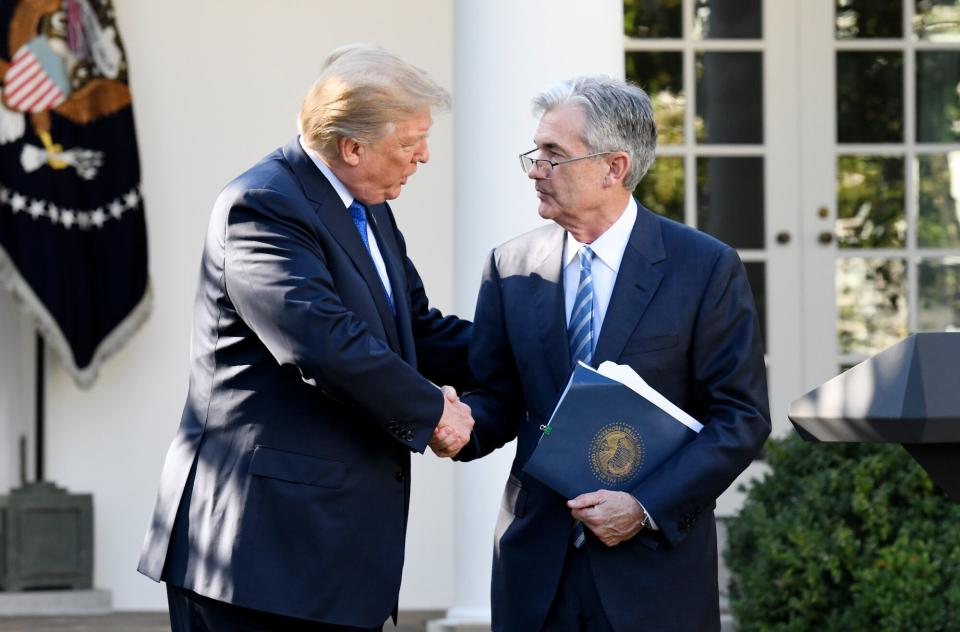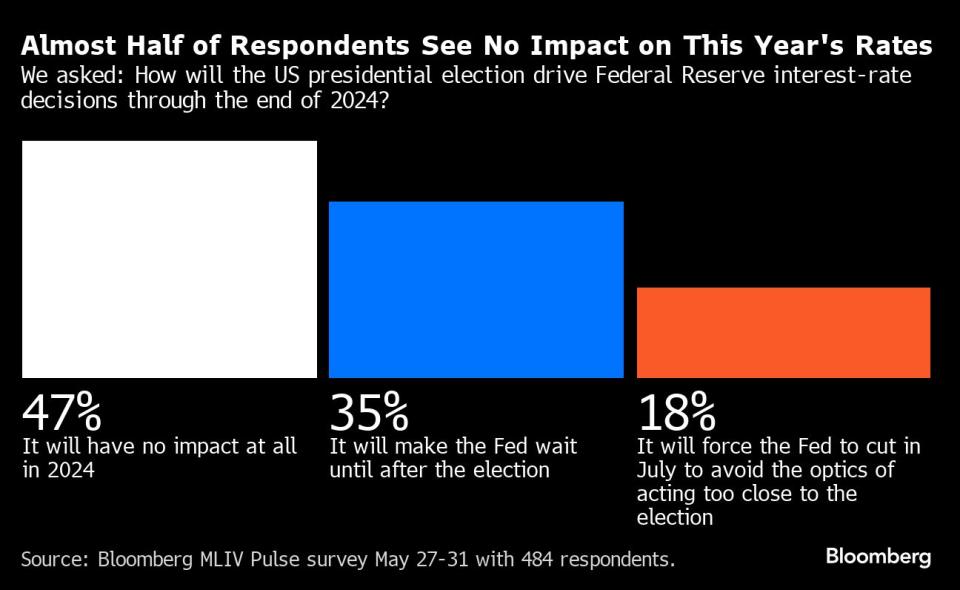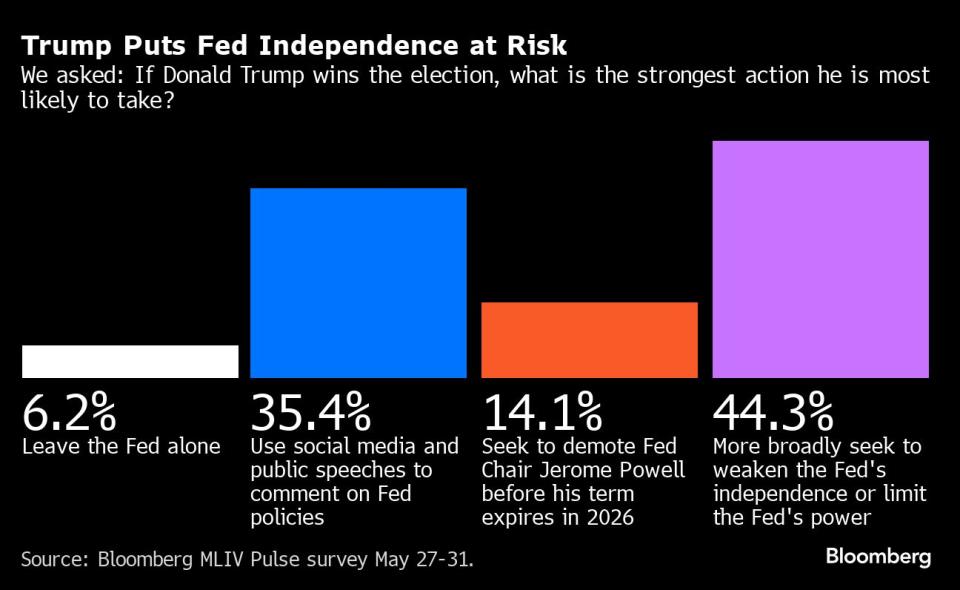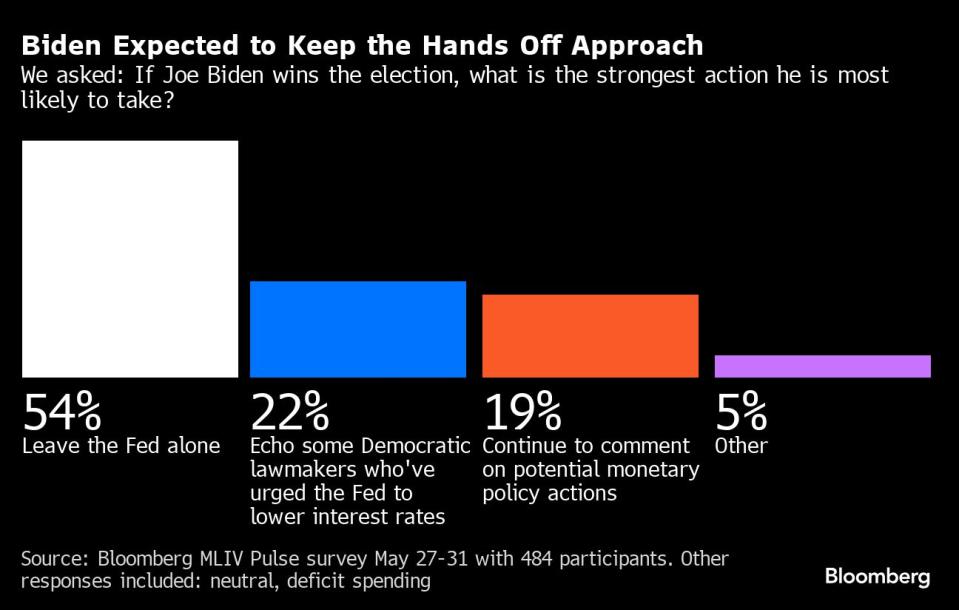A Trump Win Is Seen as a Risk to Fed Independence: Poll
- Oops!Something went wrong.Please try again later.
(Bloomberg) -- The Federal Reserve will face a significant risk of losing its independence to ramped-up political interference if Donald Trump is elected president again, according to the latest Bloomberg Markets Live Pulse survey.
Most Read from Bloomberg
Key Engines of US Consumer Spending Are Losing Steam All at Once
GameStop Shares Surge as Gill’s Reddit Return Shows Huge Bet
Mnuchin Chases Wall Street Glory With His War Chest of Foreign Money
Homebuyers Are Starting to Revolt Over Steep Prices Across US
AMLO Protege Sheinbaum Becomes First Female President in Mexico
Forty-four percent of respondents said they expect Trump to seek to politicize the central bank or limit its power if he returns to the White House. Overall, they put a probability of 40% on the Fed losing its autonomy under a second Trump administration.
A push to roll back the central bank’s independence — a step that would face significant hurdles — would likely rock financial markets, undermining investors’ faith in the Fed as overseer of the world’s largest economy and exposing it to political pressure to cut interest rates. That concern would be especially acute now, when the central bank is keeping its benchmark rate at a more than two-decade high to curb inflation and prevent the economy from overheating.
“The bond market would likely be roiled by any real attack on the Fed's independence, with fallout effects on equities," said Diane Swonk, chief economist at KPMG LLP.
Bond markets may already be unsettled in the event of a Trump victory. About 24% of 484 MLIV Pulse survey participants said a Trump win would immediately cause the 10-year Treasury yields to rise more than 25 basis points, with another 23% saying a more modest increase is the most likely outcome. Just under a quarter of respondents see yields declining slightly.
Read full results: Fed Rates 2025 Outlook Depends on Election
In his first term as president, Trump broke with decades of precedent by openly attacking Fed Chair Jerome Powell, first for raising interest rates and then for not cutting them further. More than one-third of the respondents said that Trump would likely use social media and public appearances to jawbone the Fed, though 14% anticipate that he will try to demote Powell before his term ends in 2026.
Trump has made it clear that he wouldn’t reappoint Powell to another term, but hasn’t gone much beyond that. Informal advisers have floated the possibility of reforms to give the president more control over the independent central bank, though Trump officials have stressed that any such chatter is not official unless it comes directly from the campaign. Trump hasn't proposed any challenges to the Fed's independence, a campaign official said.
Biden took the traditional hands-off toward the Fed even as it raised interest rates at the fastest pace since the early 1980s, hammering stock and bond markets with deep losses, and his advisors have argued that maintaining the central bank’s autonomy is crucial to its ability to control inflation. More than half of respondents said that under a second term Biden would leave the Fed alone.
“The Fed's independence is paramount,” said Subadra Rajappa, head of US rates strategy at Societe Generale in New York. “We often criticize the Fed for its policy actions, but the current structure has worked well over the past century.”
The survey underscores the high stakes for financial markets in the November election as most opinion polls largely signal a close rematch of the 2020 contest. It's unclear how Trump's candidacy will be affected by his recent felony conviction. With the economy exhibiting surprising strength and inflation cooling, the Fed has kept rates steady since its last increase in July.
Trump has proposed steep tariffs on imports, particularly on goods from China, and an aggressive effort to deport those working in the US illegally. He has also pledged to extend across-the-board tax cuts, which would likely worsen the federal deficit and add stimulus to an economy that the Fed is seeking to restrain. Some of his informal economic advisers have argued the money raised from various tariffs would help to pay for the tax cuts.
Survey respondents were somewhat divided on whether the election itself will influence the Fed’s deliberations on potential interest rate cuts this year. The plurality, or 47%, said the timing of the vote will have no impact on policymakers’ decision making; 35% said the Fed would delay any moves until after the election, while 18% predicted it would act in July to avoid doing so closer to Election Day.
The survey was conducted between May 27 and May 31 among Bloomberg News readers on the terminal and online and included portfolio managers, economists and retail investors.
This week, the survey asks about the market impact of the UK elections. Share your views here.
What to Watch
Economic data:
June 3: S&P Global US Manufacturing PMI (final reading); construction spending; ISM manufacturing; Wards total vehicle sales
June 4: JOLTS job openings; factory orders; durable goods (final)
June 5: MBA mortgage applications; ADP employment change; S&P Global US services PMI (final); ISM Services Index
June 6: Challenger job cuts; nonfarm productivity and unit labor costs (final); initial jobless claims
June 7: Non-farm payrolls; wholesale trade sales; household net worth change; consumer credit
Fed calendar:
Fed officials are in blackout period before June 11-12 FOMC meeting
June 7: Fed Governor Lisa Cook gives commencement address to the Girls Global Academy
Auction calendar:
June 3: 13-, 26-week bills
June 4: 42-day CMB
June 5: 17-week bills
June 6: 4-, 8-week bills
--With assistance from Nancy Cook.
(Updates with link to full results)
Most Read from Bloomberg Businessweek
Disney Is Banking On Sequels to Help Get Pixar Back on Track
The Budget Geeks Who Helped Solve an American Economic Puzzle
Israel Seeks Underground Secrets by Tracking Cosmic Particles
How Rage, Boredom and WallStreetBets Created a New Generation of Young American Traders
©2024 Bloomberg L.P.





